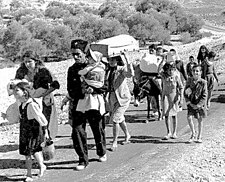| UN General Assembly Resolution 194 | |
|---|---|
 Israel flag | |
| Date | December 11 1948 |
| Meeting no. | 186 |
| Code | A/RES/194 (III) (Document) |
| Subject | Palestine—Progress Report of the United Nations Mediator |
Voting summary |
|
| Result | Adopted |
 |
| Part of a series on the |
| Nakba |
|---|
The United Nations General Assembly Resolution 194 is a resolution adopted near the end of the 1947–1949 Palestine war. The Resolution defines principles for reaching a final settlement and returning Palestine refugees to their homes. Article 11 of the resolution resolves that
refugees wishing to return to their homes and live at peace with their neighbours should be permitted to do so at the earliest practicable date, and that compensation should be paid for the property of those choosing not to return and for loss of or damage to property which, under principles of international law or equity, should be made good by the Governments or authorities responsible.[1]
The resolution also calls for the establishment of the United Nations Conciliation Commission to facilitate peace between Israel and Arab states, continuing the efforts of UN Mediator Folke Bernadotte, following his assassination.[2]
Of the 58 members of the United Nations at that time, the resolution was adopted by a majority of 35 countries, with 15 voting against and 8 abstaining. The six Arab League countries then represented at the UN, who were also involved in the war, voted against the resolution. The other significant group which voted against comprised the Communist bloc member countries,[3] all of which had already recognized Israel as a de jure state. Israel was not a member of the United Nations at the time, and objected to many of the resolution's articles. Palestinian representatives likewise rejected Resolution 194.[4]
The resolution, especially Article 11, was cited in United Nations General Assembly Resolution 302 establishing the UNRWA and other UN resolutions. It has been argued that the resolution enshrines a right of return for the Palestinian refugees,[5] a claim that Israel disputes.